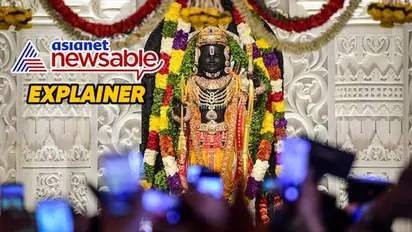Revealed: How India thwarted Pakistani and Chinese hackers' attack during Ram Mandir inauguration

Synopsis
The Telecom Security Operation Centre (TSOC) took charge of monitoring approximately 264 websites, including those associated with the Ram Temple, Prasar Bharti, UP Police, airports, UP tourism, and the power grid, among others, to preempt any cyber-attack.
Indian security agencies, including cyber investigators, faced significant challenges in January, particularly during the inauguration of the Ram Temple in Ayodhya on January 22. As reported by the Economic Times, during this period, Indian websites came under relentless attack from hackers and cyber criminals, primarily originating from China and Pakistan.
According to officials cited by the financial daily, Pakistani and Chinese hackers made concerted efforts to disrupt the websites associated with the Ram Temple, Prasar Bharti, and other digital assets crucial to Uttar Pradesh's critical infrastructure.
Government officials revealed that they had anticipated an increase in cyber-attacks during the inauguration period. The Telecom Security Operation Centre (TSOC) took charge of monitoring approximately 264 websites, including those associated with the Ram Temple, Prasar Bharti, UP Police, airports, UP tourism, and the power grid, among others, to preempt any cyber-attack.
During the vigilant round-the-clock monitoring, it was noted that approximately 140 compromised IP addresses were targeting the websites of the Ram Temple and Prasar Bharti. Upon identification, internet service providers were promptly instructed to block access to these IP addresses. Despite these measures, it was observed that malicious activities from these countries escalated on January 21, prompting the blocking of additional IP addresses.
An official stated, "After blocking 1244 IP addresses, the attacks reduced," highlighting the effectiveness of the proactive measures taken to safeguard against cyber threats.
Another official noted that aside from foreign countries, there were attempts from within India to access the digital infrastructure, prompting remedial actions.
According to one official cited by ET, there is pride in the fact that all measures to counter the cyber-attacks were domestically developed. "Before the inauguration of Ram Temple, a similar strategy was put in place to guard the digital infrastructure during the G20 summit," he stated.
The Department of Telecommunications (DoT) leveraged indigenous artificial intelligence (AI) and machine learning technologies to forecast these cyber attacks.
Stay updated with the Breaking News Today and Latest News from across India and around the world. Get real-time updates, in-depth analysis, and comprehensive coverage of India News, World News, Indian Defence News, Kerala News, and Karnataka News. From politics to current affairs, follow every major story as it unfolds. Get real-time updates from IMD on major cities weather forecasts, including Rain alerts, Cyclone warnings, and temperature trends. Download the Asianet News Official App from the Android Play Store and iPhone App Store for accurate and timely news updates anytime, anywhere.